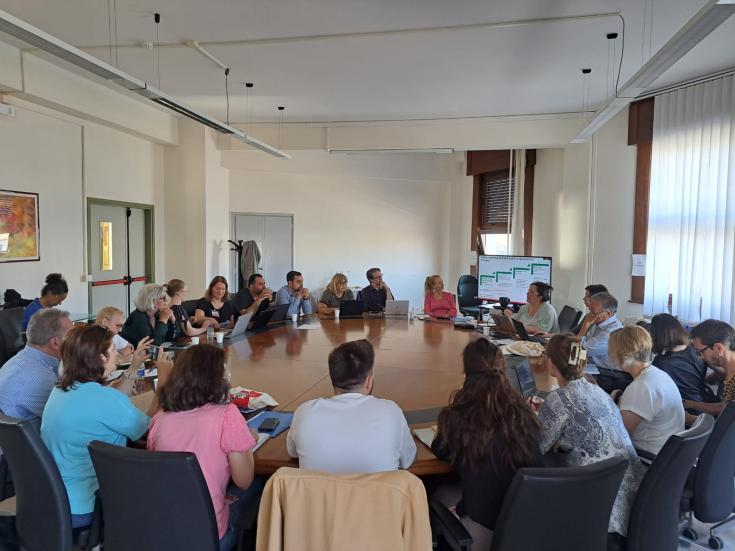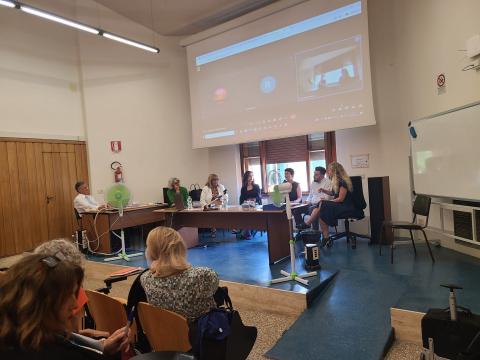SALAM kicks off in Florence with thematic seminars

The Interreg Europe project SALAM – Sustainable Accessibility to the Labour Market – kicked off in Florence between 6-7 June 2024. The project is coordinated by the University of Florence in cooperation with the Region of Tuscany, in addition to the region of Centre Val de Loire, Catalonia, Region Västra Götaland, & Mark Municipality; Baden-Württemberg & Association of the folk high schools Baden-Württemberg; West Regional Development Agency & Timisoara University and the European Association of Regional and Local Authorities for Lifelong Learning.
Alessandra Petrucci, Rector of the University of Florence opened the seminar and Alessandra Nardini, Regional Minister, Tuscany Regional Government, outlined the importance of SALAM as Tuscany pays attention to not exclude anyone, particularly by recognizing the right for everyone to work. Francesca Torlone, University of Florence, welcomed participants and introduced SALAM as coordinator.
Round Table on the Adult Education Survey with representatives from SALAM’s regions

The Adult Education Survey is held every three years between 18-64 year olds across Europe, for adults who were engaged in learning within the last 12 months. During a roundtable, chaired by Paolo Federighi, Hon. Prof., University of Florence asked each speaker for their interpretation of the 2022 edition and their existing tools they would like to develop upon in SALAM.
Tuscany Regional Government (Italy), represented by Sabina Stefani, Head of Continuous training planning Unit highlighted that the data shows a low education of Italians in education and training, and this will be a focus for the region as they pay special attention to the employment of young people and try to offer education for all ages. In Tuscany, work-life balance is also important, and is a priorty.
Centre Val de Loire (France), represented by Lise Cheriff, Employment and lifelong learning service noted that the data of the survey provides a picture where France is comparatively successful in the EU, but the region would still like to improve.. Ms. Karin Gloanec Maurin, Regional councilor for Europe, European cooperation and International economic exchanges, Centre Val de Loire added that she is very happy for the cooperation between Centre Val de Loire and Tuscany, as the two regions have signed an agreement recently.
Public Employment Service of Catalonia (Spain) was represented by Susana Díaz Martínez, Deputy Director of Active Employment Policies of Public Employment Service of Catalonia and Lupe Moreno Iturriaga, Deputy Director of Migrations, Refuge and Anti-Racism Coordination. Catalonia would like to continue to improve their employment and training policies with a focus on the migrant population.
Region Västra Götaland/Mark Municipality (Sweden), was represented by Therese Ydrén, Project coordinator and manager for the AMIF funded project “Helhetslyftet”; aiming at strengthening labour market integration, Region Västra Götaland, the administration of folk high schools. The data shows that 80% of those between 18-24 are active in the Swedish labour market, but this figure is doubles for foreign-born individuals. Matching the qualifications of foreigners to the local labour market remains a priority.
The Association of the folk high schools Baden-Württemberg (Germany), represented by Julia Gassner, Deputy Director, Volkshochschulverband Baden-Württemberg e. V., discussed how the region has strongly invested in adult learning, and has formed the Alliance for Lifelong Learning which sets 5-year goals and develops and funds projects in the field. The region would like to continue to develop two of its strategies: continuous on-the-job language training and early stages of orientation and guidance.
The West Regional Development Agency/Timisoara University (Romania) was represented by Paul Opris-Sirca, GIS Data Specialist and Regional Planning Consultant, West Regional Development Agency. The region would like to continue to develop its regional development strategy and work on retaining and attracting new skilled talent.
Discovering Tuscany’s Regional Policy Instruments for Entrepreneurship
In the afternoon of June 6, a seminar focused on Tuscany’s regional policy instruments for entrepreneurship. Sabina Stefani, Continuous Training Department, Tuscany Government discussed regional Policy Programmes and Actions in the field of entrepreneurship for Italian and foreign citizens living in the regional territory. The Tuscany region hopes through SALAM to be able to extrapolate the success of these policies to further include migrants. Many other representatives from Tuscany’s diverse stakeholders were invited to present their policies, including from the Social and Welfare Department, ARTI and COeSCO Empoli.
On June 7, partners met to discuss the project’s management, communication and plan next steps, hosted by the Region of Tuscany.
